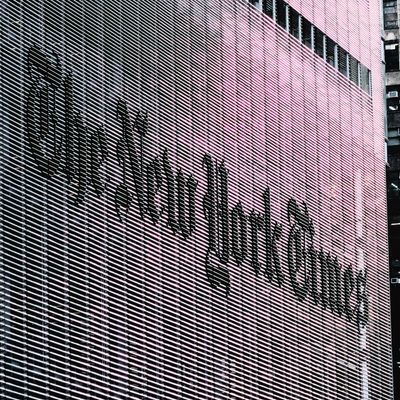
New York civic life suffered a serious setback this week when the most powerful news organization in the world announced it will no longer bother to help its readers decide who should run our city and state. “The paper does not plan to take a stance in Senate, congressional or state legislative races in New York this fall, or in next year’s New York City elections,” the paper’s “Opinion” editor, Kathleen Kingsbury, said in a statement brimming with callous indifference.
We don’t know why the Times no longer wishes to help New Yorkers make choices about city, state, and federal leaders, as it has done since the board’s creation in 1896. Kingsbury “did not give a reason for the shift,” according to the paper’s own reporters. We can safely rule out cost considerations: Just last week, the paper reported a profit of $104.7 million over the last quarter, along with 300,000 new subscribers. The Times now has 10.8 million subscribers (10.2 million of them digital only) and recorded a 13.6 percent jump in earnings compared to last year.
I’ve met several of the 13 members of the paper’s editorial board and know something about how they operate, having spent eight years doing similar work as a member of the editorial boards of the Daily News and the New York Sun. They form an impressive team that regularly mounts impressive, in-depth crusades; just last year, a series on terror and violence committed by right-wing political extremists was a finalist for the Pulitzer Prize. In 2019, Board Member Brent Staples won a Pulitzer for editorials that the prize committee found were written “with extraordinary moral clarity” about race and racism.
The logical extension of this fine work is to tell readers which candidates, in the board’s judgment, can best move New York forward. The guidance is necessary, not optional. Our big, busy city is governed by an army of elected representatives: 51 City Council members, plus five borough presidents, five district attorneys, a comptroller, a public advocate, and a mayor, along with a dozen members of Congress, approximately 100 members of the State Assembly and Senate and a governor, a lieutenant governor, a comptroller, an attorney general, and two U.S. senators.
Assuming even a modest amount of competition, voters can easily find themselves choosing from among hundreds of candidates in any given year to fill offices that control hundreds of billions in annual expenditures and determine New Yorkers’ streets, schools, housing, commerce, public safety, and other vital services. The average New Yorker, short on time, simply can’t be expected to follow the ins and outs of the many feuds, fights, and policy choices that pop up in various districts or the municipal, state, and federal battles that each official will encounter.
By long-standing democratic tradition, newspaper readers rely on editorial boards to help guide them through a thicket of issues, personalities, and promises before Election Day, based on core values around which citizens and leaders can gather, debate, and govern.
“The board argues for a world that is both free and fair, believing that societies must struggle to reconcile these values in order to succeed,” reads the Times’ website. “It has long supported a liberal order of nations in which freedom and progress advance through democracy and capitalism. But it has also sought to guard against the excesses of those systems by promoting honest governance, civil rights, equality of opportunity, a healthy planet and a good life for society’s most vulnerable members.”
Those high-minded goals mostly get realized through a daily grind of research, reporting, and persuasive writing to surface problems, question authority, spotlight innovation, and demand change. And when the time of choosing arrives, it is a paper’s editorial watchdogs that let readers know who has played it straight, who’s been lying, who has potential, and who has conflicts of interest. Local endorsements are as much a form of public service as is warning readers about a coming snowstorm, a road closure, or the outbreak of a disease. They also serve as a carrot-and-stick incentive to candidates to tackle and discuss problems and solutions.
Twenty-seven summers ago, as a candidate for City Council in Brooklyn, I made the trip to the old Times building on 43rd Street and nervously argued a case that our district needed a change. The board members agreed and gave me their endorsement. (“He seems well grounded in the issues facing the City Council, and offers practical ideas about how to encourage business development in the city’s minority communities.”) I didn’t win the primary, but the backing unquestionably helped.
Fast-forward to 2021, when the Times’ endorsement of Kathryn Garcia in the Democratic primary for mayor brought her within 7,000 votes of victory in a crowded field of seasoned politicians. Even if you questioned their logic, the board made a persuasive case for what we should be looking for in a mayor. Past endorsements have helped build local political players with outsize national influence. Two of the most powerful members of congress, Senate Majority Leader Chuck Schumer and House Minority Leader Hakeem Jeffries, both started in the State Assembly before rising to Congress, and both have benefited from the support of the Times and other papers to win reelection.
All of that is now set to be a thing of the past. Like other subscribers, I’m happy to get Wordle, cooking recipes, and book reviews from the Times. But there’s something much larger at stake: New York voters, with the help and guidance of editorial boards, brought the nation larger-than-life leaders including Al Smith, Fiorello La Guardia, Ed Koch, Shirley Chisholm, Jacob Javits, Mario Cuomo, and Franklin and Theodore Roosevelt. The Times now unwisely has decided to throw up its hands and let New York’s leaders emerge based on the half-truths promoted by politicians rather than the vast trove of reliable information gathered by the paper of record.
What a colossal blunder.






























